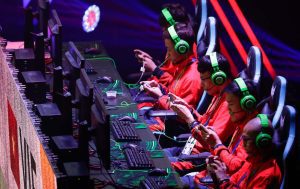When was the last time gaming brought the world together? Whether you’re jumping into an epic battle royale or playing a co-op campaign with friends, gaming has become more than just a pastime—it’s a global phenomenon. And nowhere is this more apparent than in the rise of e-sports. Over the last decade, competitive gaming has exploded, bridging the gap between casual players and elite professionals. But what’s driving this shift, and what trends are shaping the future of gaming for everyone?
In this blog, we’ll take a deep dive into the evolution of e-sports, uncovering trends, exploring how technology is transforming the gaming landscape, and offering tips for casual players to join the competitive scene. Whether you’re a loyal fan, seasoned competitor, or a brand-new gamer curious about the e-sports world, there’s something here for everyone.
E-Sports and Its Impact on the Gaming Community

E-sports, short for “electronic sports,” refers to competitive gaming at a professional level, where players and teams face off in structured tournaments. While gaming began as a niche hobby, e-sports has helped transform it into a cultural powerhouse, uniting millions of fans and players worldwide. Today, global tournaments for games like League of Legends, Counter-Strike, and Fortnite attract viewership rivaling that of traditional sports like basketball or soccer.
For casual gamers, e-sports has also introduced a sense of aspiration. Watching professional players achieve gaming mastery inspires individuals to improve their own skills, fostering a dynamic intersection between casual play and competitive ambition.
The Evolution of Casual Gaming to Competitive E-Sports
Gaming hasn’t always been synonymous with global competition. Early video gaming history was rooted in casual, single-player experiences or couch multiplayer matches with friends. Titles like Super Mario Bros. and Street Fighter were fun but didn’t require global rankings or massive tournaments.
The leap to e-sports as we know it happened in the mid-2000s. Accessibility to high-speed internet allowed gamers worldwide to compete online. Platforms like Xbox Live, PlayStation Network, and PC gaming hubs such as Steam made connecting easy. Video-sharing sites like YouTube and streaming giants like Twitch further enhanced visibility, allowing talented gamers to showcase their skills to a burgeoning audience.
Trends in Competitive Gaming: From Genres to Platforms
Certain genres dominate the e-sports industry, including first-person shooters (FPS), multiplayer online battle arenas (MOBA), and battle royale games. Titles like Call of Duty, Dota 2, and PUBG are fixtures in tournaments globally, but the trend toward genre diversity is growing.
One trend reshaping the competitive scene is cross-platform accessibility. Games like Fortnite and Rocket League now allow console, PC, and mobile players to compete against each other seamlessly. Cloud gaming platforms like NVIDIA GeForce NOW and Xbox Cloud Gaming are also expanding access, making competitive gaming possible on almost any device.
The Rise of Mobile E-Sports and Its Impact
Mobile e-sports have upended the traditional gaming hierarchy. Once considered inferior to PC and console setups, mobile gaming has come into its own as smartphones get smarter and more powerful. Titles such as PUBG Mobile, Free Fire, and Mobile Legends have been at the forefront of this meteoric rise.
What’s driving this trend? Accessibility. With billions owning smartphones, mobile e-sports reaches audiences that may not have access to high-end gaming PCs or consoles. Countries like India, the Philippines, and Indonesia are emerging as bastions of mobile e-sports, hosting massive tournaments with substantial prize pools.
The Role of Technology in Shaping the Future of E-Sports
Behind every great e-sports competition is groundbreaking technology pushing limits. Advancements in graphics cards, monitors with higher refresh rates, and the rise of virtual reality (VR) gaming have not only elevated gameplay but also redefined the viewing experience for audiences.
Artificial intelligence (AI) is another game-changer. AI bots are being used to train aspiring competitive players, replicating scenarios that mirror professional matches. Additionally, 5G internet continues to make online gaming smoother than ever, reducing lag and ensuring equitable match conditions across continents.
Nurturing a Competitive Mindset: Tips for Casual Gamers to Transition into E-Sports

For casual gamers dreaming of entering the competitive arena, the transition starts with mindset and strategy:
- Master Your Favorite Game: Choose one game to specialize in and dedicate time to mastering its mechanics. Focus on understanding advanced techniques, strategies, and updates.
- Play Ranked Matches: Most competitive games feature ranked modes. Begin climbing the ladder to test your skills against increasingly challenging opponents.
- Study the Pros: Watch professional matches on platforms like Twitch or YouTube. Observe how experts make decisions under pressure and learn from their tactics.
- Join Communities: Engage in online forums, Discord servers, or in-game chats to network with other players, learn tips, and form teams.
- Practice Physical and Mental Balance: Avoid gaming burnout by maintaining a healthy balance between practice, exercise, and daily life. Physical and mental fitness both play roles in competitive success.
The Global E-Sports Community: Diversity and Inclusivity
One of the most remarkable aspects of e-sports is its global ecosystem. It’s not just Western or Asian countries dominating; e-sports thrives across continents. With diverse representation on professional teams and inclusivity campaigns like “Women in Gaming,” e-sports continues to foster a sense of belonging for individuals from all walks of life. Whether you’re young or old, amateur or pro, e-sports has a place for everyone.
E-Sports and Education: The Intersection of Gaming and Learning
E-sports isn’t just entertainment—it’s a learning opportunity. Universities worldwide are now offering e-sports scholarships for standout players, while some high schools are integrating competitive gaming into their curriculums. Lessons learned on the digital battlefield—teamwork, strategic thinking, and resilience—often translate into life and career skills.
Recently, e-sports has inspired a wave of innovation within STEM education. Building gaming PCs, analyzing in-game data, and even coding your own game encourage problem-solving in ways traditional methods can’t replicate.
The Business of E-Sports: Opportunities and Challenges
E-sports is rapidly becoming one of the most lucrative industries in entertainment. Revenue streams include sponsorship deals, in-game purchases, ticket sales for live events, and merchandise.
However, challenges still exist. While viewership grows, the industry faces hurdles such as player burnout, balancing crowd funding with corporate interests, and addressing concerns about inclusivity for marginalized groups.
Predictions for the Future of E-Sports and Competitive Gaming
Looking forward, the next decade of e-sports promises even more evolution:
- Metaverse Integration: Virtual competitions hosted in immersive metaverse settings could redefine the concept of arenas.
- AI-Driven Coaching: AI tools will help casual players improve exponentially, closing skill gaps faster.
- Hybrid Tournaments: Expect simultaneous online and offline tournaments enabling global access while retaining the charm of a live audience.
- Sustainable E-Sports: More focus will go toward eco-friendly tournaments, reducing waste from energy-intensive live events and merchandise production.
Get in the Game

The evolution of e-sports is far from over, and there’s never been a better time to dive in. Whether you’re a casual gamer seeking inspiration, a competitive player looking to advance, or a business professional curious about industry opportunities, e-sports offers endless possibilities.
Looking to transition from casual to competitive? Share your thoughts, join active gaming forums, and explore the exciting world of e-sports firsthand. The global gaming community is waiting for you. Who knows—you might even become the next e-sports legend.












